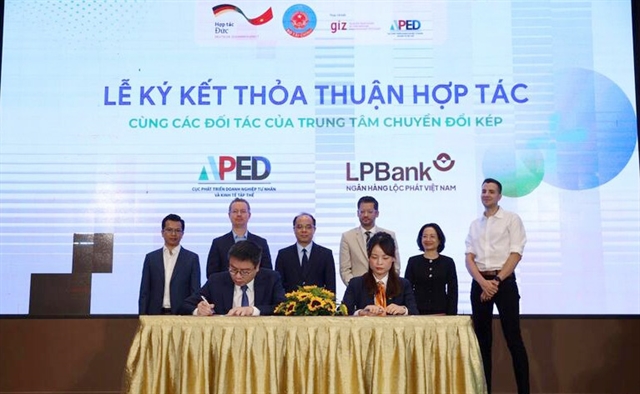 Economy
Economy


|
| The signing of cooperation agreements with strategic partners of the Twin Transition Hub on Monday. — Photo baodautu.vn |
HÀ NỘI — Twin transition, which integrates digital and green transformation, is no longer optional but vital for Vietnamese small and medium-sized enterprises (SMEs) seeking to enhance competitiveness and expand their global presence, heard a conference jointly organised by the Agency for Private and Collective Economy Development (APED) and German development agency GIZ on Monday.
Deputy Director of the Advisory Council for Private Economic Development (Board IV) Bùi Thanh Minh said at the Việt Nam Enterprise Twin Transition Partnership Conference 2025 (VETTP) that economic growth targets, global market pressures and national climate commitments are key drivers of the twin transition push.
Việt Nam aims for double-digit economic growth during the 2026–30 period.
“To achieve this goal, there is no other way but digital and green transformation to increase productivity and efficiency,” Minh said.
He noted that stricter international standards such as the EU’s Carbon Border Adjustment Mechanism (CBAM) and environmental, social and governance (ESG) requirements from major markets, including China and Japan, are becoming new non-tariff barriers. He cited statistics showing that up to 90 per cent of global trade now faces environmental or traceability restrictions.
Minh added that Việt Nam has committed to achieving net-zero emissions by 2050, making twin transition essential to reducing greenhouse gas emissions and mitigating the impacts of climate change.
APED Director Bùi Anh Tuấn highlighted the crucial role of the private sector in driving this transformation, with more than one million firms and 5.2 million business households, 98 per cent of which are SMEs.
According to Jens Schmidt Kreye, deputy head of Development Cooperation at the German Embassy in Việt Nam, twin transition is no longer a trend but a reality, urging Vietnamese SMEs to adapt swiftly to remain competitive.
However, a significant readiness gap remains.
Figures revealed at the VETTP showed that around 64 per cent of SMEs have yet to take concrete steps towards twin transition, while 54 per cent have only implemented fragmented, customer-focused digital initiatives.
A study by FinnGroup found that SMEs’ twin transition remains at an early and fragmented stage, focusing mainly on isolated digitalisation efforts and minimal green compliance due to concerns about high costs and limited awareness of long-term benefits.
The study identified major barriers including limited financial and technological capacity, weak leadership commitment and a lack of reliable information and appropriate solutions.
The Vietnamese Government has introduced several breakthrough policies to support private sector growth and twin transition, including Resolution No 68-NQ/TW dated May 4 on private sector development, and Resolution No 57-NQ/TW dated December 22, 2024 on science, technology and digital transformation.
Twin transition hub
At VETTP 2025, the Twin Transition Hub was launched as a new public-private partnership (PPP) initiative designed to accelerate both digital and green transformation among domestic businesses and SMEs, strengthening their global competitiveness.
The hub will act as a central platform connecting SMEs with credit institutions, domestic and international experts and technology providers to help them reduce emissions, improve productivity and participate in global value chains.
According to Tuấn, the hub will comprise a central coordination centre and several regional and sectoral satellites in locations such as Hà Nội and HCM City. It will have four main functions: providing consultancy and roadmap design, training and capacity building, connecting with solution providers and supporting pilot implementation.
As an initial step, the hub signed cooperation agreements at the conference with nine strategic partners including LPBank, Beacon Fund, Global Reporting Initiative (GRI) Netherlands, Ernst & Young Vietnam, the Bắc Ninh Industrial Production Association and several green technology consultants.
Vũ Nam Hương, deputy director General of LPBank, said the hub is expected to become a crucial bridge connecting Vietnamese enterprises with international investors and green capital flows. — VNS




